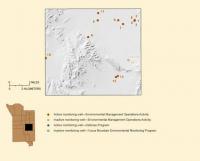-
U.K. to destroy biometric information of 45 terror suspects due to botched paperwork
British security agencies will have to destroy fingerprints and DNA of forty-five terror suspects because the police retained the biometric samples longer than the law allows. The law does allow the police to keep biometric information of terrorism suspects indefinitely, but certain paperwork must be completed within a certain period of time to allow that, and if the paperwork is not completed, the samples must be destroyed. A new report reveals that Britain holds biometric information and materials on nearly 8,000 suspects.
-
-
U.S. captures head of ISIS chem weapons unit; targets ISIS chem weapons infrastructure

U.S. Special Forces operating in Iraq captured the head ISIS chemical weapons unit. Sleiman Daud al-Afari, who worked for Saddam Hussenin’s now-disbanded Military Industrialization Authority where he specialized in chemical and biological weapons, was captured during a raid near the northern Iraqi town of Tal Afar last month.American and Iraqi officials say that there are many indications that ISIS is working hard to develop chemical weapons.
-
-
Trump’s campaign rhetoric, ISIS and the law of war
Presidential candidate Donald Trump said that one reason the U.S. war against ISIS is “ineffective” is that “We’re fighting a very politically correct war.” Exactly what Trump is suggesting doing is not clear, but it is significant that Trump recently acknowledged that the U.S.“is bound by laws and treaties” and that as president he would “not order a military officer to disobey the law.” Instead, he said he would “seek [the] advice” of military and other officials. This is good news, and something all the candidates – and their critics – ought to embrace, as applying the law of war in the twenty-first century is much more complicated than many think. Words do matter, and where the nation’s security is concerned, no words can be more important..
-
-
State-level immigration policies should be subject of cost-benefit analysis
While immigration policy has been the purview of the U.S. federal government, nearly all states have taken a more-active role on the issue of unauthorized immigration in the past fifteen years through actions such as making drivers licenses available regardless of immigration status and requiring employers to verify eligibility to work, according to a new study. States, however, rarely examine the costs and benefits of such policies before enacting them, suggesting the need for a comprehensive tool to help state policymakers assess the full range of costs and benefits of immigration policies before they are adopted.
-
-
Senior ISIS leader Abu Omar al-Shishani killed in U.S. strike

Abu Omar al-Shishani, a Syrian-based Georgian national who was a senior ISIS leader, was killed in a 4 March air strike by the U.S.-led coalition. U.S. officials said that the militant was killed near the Syrian town of al-Shadad. He had a reputation as a close military adviser to ISIS’s leader Abu Bakr al-Baghdadi, who relied heavily on Shishani.
-
-
ISIS plotted to kidnap Malaysia’s prime minister, other high officials
Ahmad Zahid Hamidi, Malaysia’s deputy prime minister, said Malaysia had foiled a plot by ISIS to kidnap government leaders, including the country’s prime minister. Hamidi to say that jihadists attempted to kidnap him and two other Malaysian officials — including the prime minister Najib Razak and the defense minister, Hishammuddin Hussein.
-
-
Secretive Area 6 used to test aerial radiation detection equipment

Top-secret Nevada site – even more secret than neighboring Area 51 — is used by Pentagon, DHS to test drones equipped with sensors to detect radioactive material which could be used in dirty bombs. The site, located in Yucca Flat, was once used for nuclear testing.
-
-
U.S. air strikes kills 150 al-Shabaab militants in Somalia

Strikes by U.S. drone ad manned aircraft has killed 150 al-Shabaab fighters in Somalia, the Pentagon said on Monday. The strikes were conducted on Saturday against the Raso Camp, 120 miles north of Mogadishu, where the al-Qaeda-affiliated Islamist group built a training facility.
-
-
ISIS hackers post N.J. police officers’ details online, calling on followers to attack them

ISIS hackers have posted the personal details of U.S. officials online, encouraging the group’s supporters to carry out “lone wolf” attacks against them. The Caliphate Cyber Army (CCA), formerly known as the Islamic Cyber Army, posted the personal details of fifty-five New Jersey police officers last week after hacking into the Web site of the New Jersey Transit police.
-
-
The staggering cost of war to Syria, neighbors

A new report evaluates the economic losses to Syria, Lebanon, Jordan, and Turkey to date and into the future. The report concludes that the cost of conflict to Syria is an estimated $275 billion in lost growth opportunities. If the conflict continues to 2020, the cost of conflict to Syria will be $1.3 trillion.
-
-
Calif. terrorists’ iPhone may have been used to introduce malware into data networks: DA

San Bernardino County District Attorney Michael Ramos has advanced what experts describe as an unusual reason for forcing Apple to allow the FBI to break the password of the iPhone used by the two terrorists as part of the agency’s investigation of the attack. Ramos says the phone might have been “used as a weapon” to introduce malicious software to county computer systems.
-
-
Dissident republicans’ weapons cache discovered in Northern Ireland
Police Service of Northern Ireland (PSNI) has discovered a terrorist weapons cache in a forest park in Northern Ireland. Police have been warning for a whole that dissidents republicans were planning to ramp up violence in the run-up to the centenary of the 1916 Easter Rising against British rule in Dublin.
-
-
Four African innovators selected for engineering innovation prize
Following an open, competitive, application process which saw entries from fifteen countries in sub-Saharan Africa, twelve African entrepreneurs were chosen to receive a package of six months of business training and mentoring from the U.K.’s Royal Academy of Engineering. The four finalists showing the greatest promise have now been chosen, and are in with a chance to become the overall winner. Each will receive at least £10,000 with the grand prize of £25,000 to be awarded at a ceremony in Cape Town on 1 June. A low-cost sustainable water filter system to provide clean and safe drinking water, and a service that allows African mobile phone users to switch easily between multiple mobile networks are among the four African innovations selected by the Academy.
-
-
U.S. to send troops to Nigeria to help fight Boko Haram
Hundreds of U.S. military advisers would soon be on their way to the front lines of the battle raging in north-east Nigeria and neighboring countries against the Islamist Nigerian insurgency Boko Haram. The plan to send U.S. military personnel to the area was as part of a recent confidential assessment by the top U.S. Special Operations commander for Africa, Brig. Gen. Donald C. Bolduc.
-
-
Sahel youths susceptible to radicalization: UN envoy

Hiroute Guebre Sellassie, UN envoy to the Sahel region in Africa, said last week that up to forty-one million young people in the Sahel have nothing hut a bleak future to look to, pushing them to migrate and making them susceptible to radicalization. She said that young people under age 25 in Burkina Faso, Chad, Mali, Mauritania, and Niger “face hopelessness.” She noted that 44 percent of children in the Sahel lack access to primary education and only 36 percent of the population can read or write.
-
More headlines
The long view
Factories First: Winning the Drone War Before It Starts
Wars are won by factories before they are won on the battlefield,Martin C. Feldmann writes, noting that the United States lacks the manufacturing depth for the coming drone age. Rectifying this situation “will take far more than procurement tweaks,” Feldmann writes. “It demands a national-level, wartime-scale industrial mobilization.”
No Nation Is an Island: The Dangers of Modern U.S. Isolationism
The resurgence of isolationist sentiment in American politics is understandable but misguided. While the desire to refocus on domestic renewal is justified, retreating from the world will not bring the security, prosperity, or sovereignty that its proponents promise. On the contrary, it invites instability, diminishes U.S. influence, and erodes the democratic order the U.S. helped forge.
Fragmented by Design: USAID’s Dismantling and the Future of American Foreign Aid
The Trump administration launched an aggressive restructuring of U.S. foreign aid, effectively dismantling the United States Agency for International Development (USAID). The humanitarian and geopolitical fallout of the demise of USAID includes shuttered clinics, destroyed food aid, and China’s growing influence in the global south. This new era of American soft power will determine how, and whether, the U.S. continues to lead in global development.
Water Wars: A Historic Agreement Between Mexico and US Is Ramping Up Border Tension
As climate change drives rising temperatures and changes in rainfall, Mexico and the US are in the middle of a conflict over water, putting an additional strain on their relationship. Partly due to constant droughts, Mexico has struggled to maintain its water deliveries for much of the last 25 years, deliveries to which it is obligated by a 1944 water-sharing agreement between the two countries.
How Disastrous Was the Trump-Putin Meeting?
In Alaska, Trump got played by Putin. Therefore, Steven Pifer writes, the European leaders and Zelensky have to “diplomatically offer suggestions to walk Trump back from a position that he does not appear to understand would be bad for Ukraine, bad for Europe, and bad for American interests. And they have to do so without setting off an explosion that could disrupt U.S.-Ukrainian and U.S.-European relations—all to the delight of Putin and the Kremlin.”
How Male Grievance Fuels Radicalization and Extremist Violence
Social extremism is evolving in reach and form. While traditional racial supremacy ideologies remain, contemporary movements are now often fueled by something more personal and emotionally resonant: male grievance.
